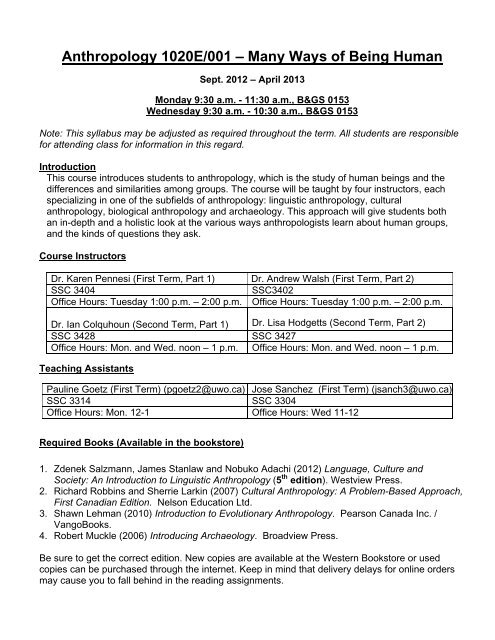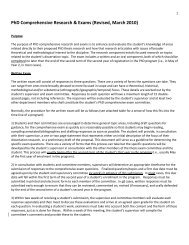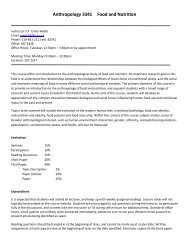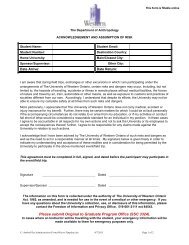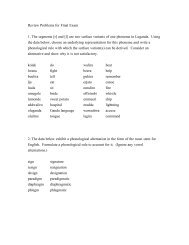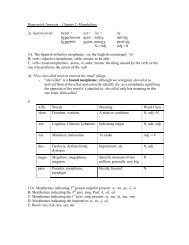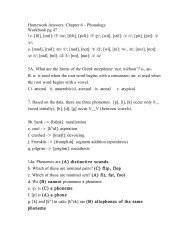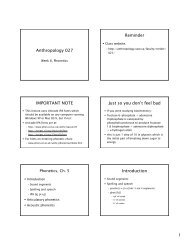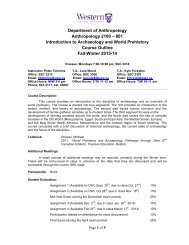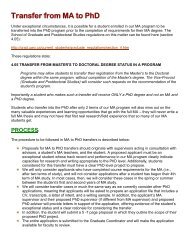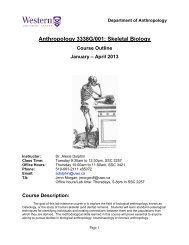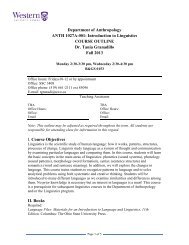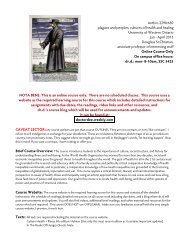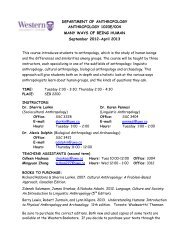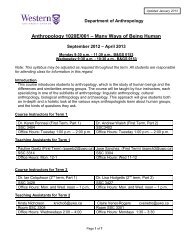Anthropology 1020E/001 â Many Ways of Being Human
Anthropology 1020E/001 â Many Ways of Being Human
Anthropology 1020E/001 â Many Ways of Being Human
You also want an ePaper? Increase the reach of your titles
YUMPU automatically turns print PDFs into web optimized ePapers that Google loves.
<strong>Anthropology</strong> <strong>1020E</strong>/<strong>001</strong> – <strong>Many</strong> <strong>Ways</strong> <strong>of</strong> <strong>Being</strong> <strong>Human</strong><br />
Sept. 2012 – April 2013<br />
Monday 9:30 a.m. - 11:30 a.m., B&GS 0153<br />
Wednesday 9:30 a.m. - 10:30 a.m., B&GS 0153<br />
Note: This syllabus may be adjusted as required throughout the term. All students are responsible<br />
for attending class for information in this regard.<br />
Introduction<br />
This course introduces students to anthropology, which is the study <strong>of</strong> human beings and the<br />
differences and similarities among groups. The course will be taught by four instructors, each<br />
specializing in one <strong>of</strong> the subfields <strong>of</strong> anthropology: linguistic anthropology, cultural<br />
anthropology, biological anthropology and archaeology. This approach will give students both<br />
an in-depth and a holistic look at the various ways anthropologists learn about human groups,<br />
and the kinds <strong>of</strong> questions they ask.<br />
Course Instructors<br />
Dr. Karen Pennesi (First Term, Part 1) Dr. Andrew Walsh (First Term, Part 2)<br />
SSC 3404<br />
SSC3402<br />
Office Hours: Tuesday 1:00 p.m. – 2:00 p.m. Office Hours: Tuesday 1:00 p.m. – 2:00 p.m.<br />
Dr. Ian Colquhoun (Second Term, Part 1) Dr. Lisa Hodgetts (Second Term, Part 2)<br />
SSC 3428 SSC 3427<br />
Office Hours: Mon. and Wed. noon – 1 p.m. Office Hours: Mon. and Wed. noon – 1 p.m.<br />
Teaching Assistants<br />
Pauline Goetz (First Term) (pgoetz2@uwo.ca) Jose Sanchez (First Term) (jsanch3@uwo.ca)<br />
SSC 3314 SSC 3304<br />
Office Hours: Mon. 12-1 Office Hours: Wed 11-12<br />
Required Books (Available in the bookstore)<br />
1. Zdenek Salzmann, James Stanlaw and Nobuko Adachi (2012) Language, Culture and<br />
Society: An Introduction to Linguistic <strong>Anthropology</strong> (5 th edition). Westview Press.<br />
2. Richard Robbins and Sherrie Larkin (2007) Cultural <strong>Anthropology</strong>: A Problem-Based Approach,<br />
First Canadian Edition. Nelson Education Ltd.<br />
3. Shawn Lehman (2010) Introduction to Evolutionary <strong>Anthropology</strong>. Pearson Canada Inc. /<br />
VangoBooks.<br />
4. Robert Muckle (2006) Introducing Archaeology. Broadview Press.<br />
Be sure to get the correct edition. New copies are available at the Western Bookstore or used<br />
copies can be purchased through the internet. Keep in mind that delivery delays for online orders<br />
may cause you to fall behind in the reading assignments.
Marking Breakdown<br />
Assignment 1 10% Due Oct. 17, 2012<br />
Assignment 2 10% Due Nov. 28, 2012<br />
December Midterm 30% Scheduled by Registrar’s Office<br />
Assignment 3 10% Due Feb. 6, 2013<br />
Assignment 4 10% Due Mar. 27, 2013<br />
Final Exam 30% Scheduled by Registrar’s Office<br />
Assignments and Exams<br />
Additional information for each assignment will be provided in class or on OWL.<br />
Assignment 1: Write a language autobiography in 1000 words, reflecting on your experiences<br />
learning and using language(s) in relation to the concepts and issues we have studied in<br />
the course. The assignment is designed to get you to think about the variety <strong>of</strong> linguistic<br />
experiences and competencies individuals have and how language is connected to<br />
many other aspects <strong>of</strong> life. In particular, you should consider how culture, social<br />
structure, institutions and power relationships all affect language choices and practices.<br />
Assignment 2: Based on observations <strong>of</strong> your own family and <strong>of</strong> those around you, write a<br />
short (1000 word) essay based on Exercise 5.3 (p. 182) in Robbins and Larkin. To be<br />
discussed further in class.<br />
Midterm: The midterm exam will only cover material in the first term. It will include material<br />
covered in class and in the readings from both instructors.<br />
Assignment 3: Anthropologists <strong>of</strong>ten engage in “applied research” (e.g., ethnoprimatology<br />
and primate conservation, medical anthropology, forensic anthropology – see Lehman,<br />
Chapter 9). More and more these days, anthropologists are also using the<br />
“blogosphere” as a way to highlight their research, engage in public outreach, and raise<br />
the public’s awareness <strong>of</strong> anthropological research. Find a blog that focuses on material<br />
relevant to biological anthropology and provide a short (1000 word) critical review <strong>of</strong> the<br />
type <strong>of</strong> content presented in the blog, how the blog covers that material, and whether the<br />
blog could be usefully employed in this course as a source <strong>of</strong> supplemental material – if<br />
not, why not? What would you change?<br />
Assignment 4: Using archaeological evidence from the site <strong>of</strong> Çatalhöyük in Turkey, write a<br />
short (1000 word) account <strong>of</strong> a day in the life <strong>of</strong> someone <strong>of</strong> your own age and gender<br />
who lived there during the Neolithic period.<br />
Final Exam: The final exam will only cover material from the second term. It will include<br />
material covered in class and in the readings from both instructors.<br />
Course Policies (please read carefully)<br />
Submitting Assignments<br />
All assignments must be submitted BOTH electronically, through OWL, and as a hard copy in<br />
class. Your assignment will not be considered complete until BOTH the electronic copy and the<br />
paper copy have been received. If you are unable to submit your assignment in class, you may<br />
leave it in the drop box outside the <strong>Anthropology</strong> Main Office (SSC 3326). The drop box is<br />
emptied each morning and stamped with the previous day’s date. Do NOT submit assignments<br />
as e-mail attachments or by sliding them under the pr<strong>of</strong>essor’s door. These will be discarded
unread. Late assignments will be penalized 5% per weekday unless you provide documentation<br />
from Academic Counselling to justify an extension.<br />
Missed Deadlines<br />
Occasionally illness or other personal issues make it impossible to meet deadlines. In such cases<br />
adequate documentation must be submitted to Academic Counselling <strong>of</strong> your home faculty,<br />
according to the terms <strong>of</strong> the Senate policy regarding medical accommodation as specified at:<br />
http://www.uwo.ca/univsec/handbook/appeals/accommodation_medical.pdf. Providing such<br />
documentation is accepted by Academic Counselling, reasonable effort will be made to<br />
accommodate your situation. Without this, no accommodations will be made.<br />
Format <strong>of</strong> Assignments<br />
All written assignments must be typed, double-spaced, 12 point font, with 2.5 cm (1 inch)<br />
margins, and stapled (staplers can be purchased for less than $2 and will be useful for the rest <strong>of</strong><br />
your academic career). You may print double-sided. Number all pages beginning after the cover<br />
page. The title page must have your name, the pr<strong>of</strong>essor's name, the course number and the<br />
assignment title. Follow the guidelines <strong>of</strong> the American Anthropological Association<br />
(http://www.aaanet.org/publications/style_guide.pdf) for proper citation <strong>of</strong> references within the<br />
essay and in the bibliography. Points will be deducted if your assignment does not meet these<br />
requirements.<br />
Plagiarism and Scholastic Offences<br />
Scholastic <strong>of</strong>fences are taken seriously and students are directed to read the appropriate policy,<br />
specifically, the definition <strong>of</strong> what constitutes a Scholastic Offence, at the following website:<br />
http://www.uwo.ca/univsec/handbook/appeals/scholastic_discipline_undergrad.pdf. All<br />
required assignments may be subject to submission for textual similarity review to the<br />
commercial plagiarism detection s<strong>of</strong>tware under license to the University for the detection <strong>of</strong><br />
plagiarism. All papers submitted for such checking will be included as source documents in<br />
the reference database for the purpose <strong>of</strong> detecting plagiarism <strong>of</strong> papers subsequently<br />
submitted to the system. Use <strong>of</strong> the service is subject to the licensing agreement, currently<br />
between The University <strong>of</strong> Western Ontario and Turnitin.com (http://www.turnitin.com).<br />
Use <strong>of</strong> Electronic Devices<br />
The only electronic device allowed in class is a laptop computer, solely for the purpose <strong>of</strong> taking<br />
notes related to the class. Mobile phones must be turned <strong>of</strong>f during class. Other uses <strong>of</strong><br />
computers or other devices are distracting to the students around you, and you may be asked to<br />
leave if you disturb others in this way.<br />
Accessibility<br />
If you need this outline or any other course information in a different format, or need any other<br />
assistance to make this course accessible to you, please contact Dr. Pennesi as soon as<br />
possible so she can help. Where appropriate, get to know the people in Services for Students<br />
with Disabilities - Room 4100 in the Western Student Services Building (661-3031), as they can<br />
provide you with additional assistance specific to your personal needs.
FIRST TERM (Pennesi and Walsh)<br />
How will the course work? How can students succeed? What is anthropology?<br />
Sept. 10<br />
What is linguistic anthropology?<br />
Sept. 12 anthropology; linguistics; linguistic anthropology; methods<br />
Required Readings: Salzmann, Stanlaw, Adachi Ch. 1, 2<br />
What is unique about human language?<br />
Sept. 17 development <strong>of</strong> language; design features; nonverbal communication<br />
Required Readings: Salzmann, Stanlaw, Adachi Ch. 5, 6<br />
Sept. 19 language acquisition; multilingualism<br />
Required Reading: Salzmann, Stanlaw, Adachi Ch. 7<br />
How and why do languages change?<br />
Sept. 24 sound systems; word structure; meaning; sentence structure<br />
Required Readings: Salzmann, Stanlaw, Adachi Ch. 3, 4<br />
Sept. 26 processes <strong>of</strong> language change; reconstruction <strong>of</strong> languages<br />
Required Reading: Salzmann, Stanlaw, Adachi Ch. 8<br />
How is language used to accomplish social goals?<br />
Oct. 1 dialects; styles; pidgins and creoles; ethnography <strong>of</strong> communication<br />
Required Readings: Salzmann, Stanlaw, Adachi Ch. 9, 10<br />
Oct. 3<br />
verbal art; performance and performativity<br />
THANKSGIVING Oct. 8<br />
How do we use language to divide and unite people?<br />
Oct. 10 linguistic ideology; indexicality<br />
Required Reading: Salzmann, Stanlaw, Adachi Ch. 13<br />
Oct. 15<br />
Oct. 17<br />
identity; gender; race; ethnicity<br />
standard and non-standard language<br />
Assignment 1 due on Oct. 17<br />
How does language affect the way we think?<br />
Oct. 22 linguistic relativity; colours and kinship<br />
Required Reading: Salzmann, Stanlaw, Adachi Ch. 12<br />
How can we apply linguistic anthropology?<br />
Oct. 24 language planning; language revitalization; translation; law; ethics<br />
Required Reading: Salzmann, Stanlaw, Adachi Ch. 14
What is Cultural/Social <strong>Anthropology</strong>, and how do we do it?<br />
Oct. 29, Oct. 31, and Nov. 5<br />
Required Reading: Robbins and Larkin, Chapter 1<br />
How do people live differently?<br />
Nov. 7 and Nov. 12<br />
Required Reading: Robbins and Larkin, Chapter 2<br />
How do people understand the world differently?<br />
Nov. 14 and Nov. 19<br />
Required Reading: Robbins and Larkin, Chapter 4<br />
How do people associate with one another differently?<br />
Nov. 21, Nov. 26, and Nov. 28<br />
Required Reading: Robbins and Larkin, Chapters 5 and 6<br />
Assignment 2 due on Nov. 28<br />
How can we account for social, political and economic inequalities in the world today?<br />
Dec. 3<br />
Required Reading: Robbins and Larkin, Chapter 7<br />
Review for midterm exam<br />
Dec. 5 main ideas; concepts; types <strong>of</strong> exam questions<br />
*** Midterm Exam – During December Exam Period – (30%) ***<br />
SECOND TERM (Colquhoun and Hodgetts)<br />
What do biological anthropologists study and how do they study it?<br />
Jan. 7 and Jan. 9<br />
Read: Lehman, Chapters 1 (Intro. To Evolutionary <strong>Anthropology</strong>) and 9 (Applied<br />
<strong>Anthropology</strong>).<br />
How does genetics inform biological anthropology?<br />
Jan. 14 and Jan. 16<br />
Read: Lehman, Chapters 2 and 3 (Microevolution, Macroevolution, and Evolutionary<br />
<strong>Anthropology</strong>); see also, Ackerman (2006), “The Downside <strong>of</strong> Upright”<br />
( http://ngm.nationalgeographic.com/2006/07/bipedal-body/ackerman-text ).<br />
Why study primates? How well do we know the primate fossil record?<br />
Jan. 21 and Jan. 23<br />
Read: Lehman, Chapters 4 (Living Primates) and 5 (Origin <strong>of</strong> the Primates);<br />
see also, Roach (2008), “Almost <strong>Human</strong>”<br />
( http://ngm.nationalgeographic.com/2008/04/chimps-with-spears/mary-roach-text ).
What were the australopithecines, and are they ancestral to Homo sapiens?<br />
Jan. 28 and Jan. 30<br />
Read: Lehman, Chapter 6 (The First Hominins);<br />
see also Garrett (2005), “The People Time Forgot: Flores Find”<br />
( http://ngm.nationalgeographic.com/features/world/asia/georgia/flores-hominids-text ).<br />
How many fossil hominin species are there, and who were the Neandertals?<br />
Feb. 4 and Feb. 6<br />
Read: Lehman, Chapter 7 (<strong>Human</strong> Origins: Rise <strong>of</strong> the Genus Homo);<br />
see also, Hall (2008), “Last <strong>of</strong> the Neanderthals”<br />
( http://ngm.nationalgeographic.com/2008/10/neanderthals/hall-text ).<br />
Assignment 3 due on Feb. 6<br />
Are human races real? Insights on race from biological anthropology.<br />
Feb. 11 and Feb. 13<br />
Read: Lehman, Chapter 8 (<strong>Human</strong> Variation);<br />
see also, Shreeve (2006), “The Greatest Journey”<br />
( http://ngm.nationalgeographic.com/2006/03/human-journey/shreeve-text ).<br />
READING WEEK: Feb. 18-22<br />
What do archaeologists really do and why does it matter? Who owns the past?<br />
Feb. 25 and Feb. 27<br />
Read: Muckle: Chapter 1 and pp. 62-65 (Ethics and Archaeology)<br />
Plus additional short readings posted on OWL<br />
What can things tell us about people?<br />
Mar. 4 and Mar. 6<br />
Read: Muckle: Chapter 4; pp. 100-104 (Excavation); pp. 114-122 (Artifact Analysis)<br />
Plus additional short readings posted on OWL<br />
Why do archaeologists keep a bunch <strong>of</strong> old bones and seeds?<br />
Mar. 11 and Mar. 13<br />
Read: Muckle: pp. 122-125 (Ec<strong>of</strong>act Analysis); pp. 155-159 (Reconstructing<br />
Palaeoenvironments); pp. 164-172 (Reconstructing Subsistence Strategies,<br />
Wild vs. Domestic, and Reconstructing Diet)<br />
Plus additional short readings posted on OWL<br />
Why do archaeologists map sites?<br />
Mar. 18 and Mar. 20<br />
Read: Muckle: pp. 93-99 (Discovering Archaeological Sites); pp. 159-164 (Reconstructing<br />
Settlement Patterns)<br />
Plus additional short readings posted on OWL<br />
Was everyone equal?<br />
Mar. 25 and Mar. 27<br />
Read: Muckle: pp. 175-186<br />
Plus additional short readings posted on OWL
Assignment 4 due on Mar. 27<br />
Can the dead speak?<br />
Apr. 1 and Apr. 3<br />
Read: Muckle: pp. 187-192 (Reconstructing Ideology)<br />
Plus additional short readings posted on OWL<br />
Archaeology in action<br />
Apr. 8<br />
Review for final exam<br />
Apr. 10 main ideas; concepts; types <strong>of</strong> exam questions<br />
*** Final Exam – During April Exam Period – (30%) ***


